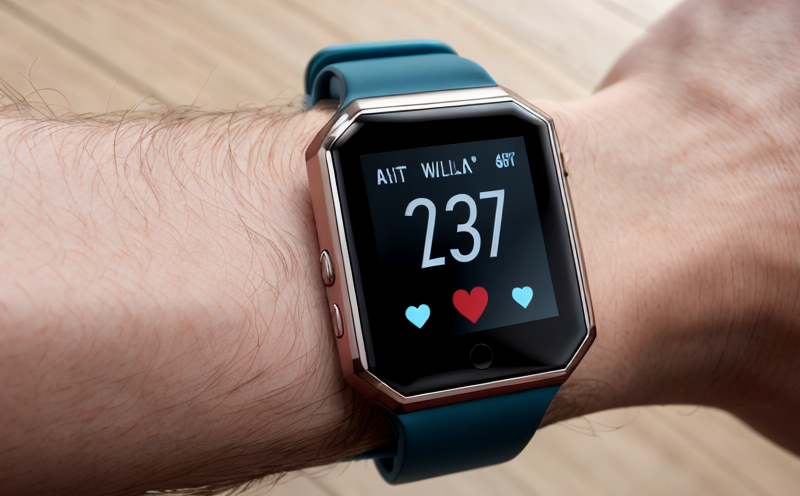Long Term Endurance Testing for Wearable Sensors
In today's fast-paced world, wearable sensors have become an integral part of our daily lives. From fitness trackers to medical monitoring devices, these sensors play a crucial role in collecting vital data that can inform decisions about health and wellness. However, the longevity and accuracy of these sensors are paramount for their effective use. Long term endurance testing is essential to ensure that wearables perform consistently over extended periods.
At our laboratory, we specialize in providing comprehensive long-term endurance tests for wearable sensors. Our team of experts uses state-of-the-art equipment and adheres to rigorous international standards to simulate real-world conditions and evaluate the performance of these devices over prolonged usage. This testing process is critical for ensuring that wearables meet regulatory requirements and deliver reliable data.
The primary goal of long-term endurance testing is to identify potential failure points in wearable sensors. By subjecting them to extended periods of use, we can uncover issues such as battery life, signal degradation, or mechanical failures before they become significant problems. This allows manufacturers to address these concerns early in the development process.
Our laboratory follows a structured approach when conducting long-term endurance tests. We begin by selecting appropriate test subjects based on industry standards and specific device characteristics. Once selected, we calibrate our equipment to ensure accurate measurements throughout the testing period. The actual testing involves exposing the sensors to various environmental factors such as temperature fluctuations, humidity levels, and exposure to sunlight.
After completing the endurance tests, our team meticulously analyzes all collected data. This analysis includes evaluating sensor accuracy, consistency, battery performance, and overall durability. Based on these results, we provide detailed reports that outline any shortcomings identified during testing. These reports serve as valuable tools for manufacturers to improve their products.
The importance of long-term endurance testing cannot be overstated, particularly in the context of medical devices. Accurate and reliable sensor data is crucial when it comes to making healthcare decisions. By ensuring that wearables pass rigorous endurance tests, we contribute significantly towards maintaining public safety standards.
Let us walk you through some key aspects of our long-term endurance testing process:
- Sensor Selection: We carefully choose sensors based on their intended application and compliance requirements.
- Calibration: All equipment used in the testing is calibrated to guarantee accurate readings throughout the test duration.
- Environmental Conditions: Sensors are exposed to a range of environmental conditions simulating real-life scenarios.
- Data Collection: Extensive data on sensor performance, battery life, and accuracy is collected during testing.
- Analysis: Collected data undergoes thorough analysis to identify any discrepancies or areas for improvement.
- Reporting: Detailed reports are prepared highlighting findings from the endurance tests.
Our long-term endurance testing service not only ensures compliance with relevant regulations but also enhances product quality and reliability. Here’s a look at some industry applications where this testing is particularly important:
| Industry | Application |
|---|---|
| Fitness Industry | Evaluating the durability of fitness trackers over extended periods. |
| Healthcare Sector | Ensuring continuous and accurate monitoring of patient health conditions. |
| Consumer Electronics | Testing smartwatches for their ability to withstand daily wear and tear. |
| Research Institutions | Simulating real-world usage patterns in academic studies involving wearable technology. |
In addition to these applications, our service also covers various use cases and application examples:
| Use Case/Application Example | Description |
|---|---|
| Fitness Tracker Longevity | Testing how long a fitness tracker can accurately track heart rate, steps taken, etc. |
| Medical Monitoring Device Reliability | Evaluating the stability of medical monitoring devices over extended periods. |
| Sports Equipment Durability | Determining how well sports equipment withstands rigorous physical activity. |
| Smartphone Sensor Stability | Assessing the consistency of smartphone sensors like accelerometers and gyroscopes. |
There are several benefits associated with long-term endurance testing for wearable sensors:
- Enhanced product reliability and longevity.
- Improved accuracy and consistency in collected data.
- Prompt identification of potential issues, allowing manufacturers to address them early.
- Increased confidence among consumers regarding the performance and safety of wearables.
- Facilitated compliance with regulatory requirements.
- Support for continuous improvement of wearable technology.
- Enhanced brand reputation through superior product quality.
With our expertise in long-term endurance testing, we aim to provide clients with reliable and accurate insights into the performance of their wearable sensors. Our comprehensive approach ensures that manufacturers can trust the results obtained from our tests. Here are some frequently asked questions regarding this service:





